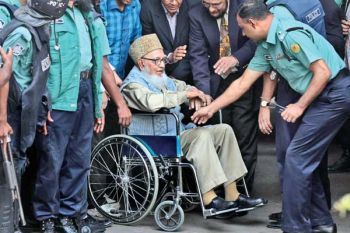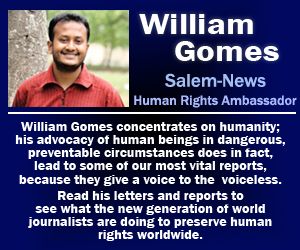
Publisher:
Bonnie King
CONTACT:
Newsroom@Salem-news.com
Advertising:
Adsales@Salem-news.com

~Truth~
~Justice~
~Peace~
TJP
Jul-17-2013 12:35

 TweetFollow @OregonNews
TweetFollow @OregonNews
Ghulam Azam's Verdict: Initial Thoughts
William Gomes Salem-News.comIt is vital for there to be an impartial international system of justice in place to oversee this process and review the trials case by case.
 "Shocking Neglect of Ghulam Azam:" Photo courtesy: ghulamazam.net |
(YORK, UK) - The controversial Bangladeshi domestic court known as the International Crimes Tribunal issued a verdict for the case of former political leader Prof Ghulam Azam on July 15 sentencing the 90-year-old to 90 years in prison -- commuted from a death penalty on account of his age. Azam stood accused of war crimes by the controversial tribunal which the Associated Press has characterized as "trying 10 opposition leaders," and which has been widely criticized as a show trial and likely to pervert rather than uphold the course of justice.
 |
Last December, leaked Skype communications from the presiding judge of the tribunal revealed what the Economist described as "collusion between judges, prosecutors and a Brussels-based lawyer with no official standing with the court." In their detailed exposé on the story, they noted that the government was applying considerable pressure on the tribunal to secure convictions. Hence the guilty verdict issued on Monday is in some respects, unsurprising.
Since the full text of the verdict is nearly 250 pages in length, proper analysis will have to wait a few days. However, first impressions are quite striking as they suggest that the prosecution has failed to produce the evidence required to secure such a conviction. As the presiding judge, Justice A T M Fazle Kabir, lamented in court, the main evidence of the prosecution consisted in newspaper clippings citing Azam as denouncing secessionists, none of which proved that he had perpetrated any war crimes. While delivering the verdict on July 15, 2013, Justice Kabir stated of Ghulam Azam that, "There are no allegations that he was physically present at any crime scene. And secondly, there are no allegations that he actively directed the commission of war crimes."
Perhaps most telling of all were the astonishing remarks Justice Kabir made, in open court, in which he suggested that convictions deserving the death penalty had been made on the basis of insufficient evidence. In explaining why it took three months to finally announce a verdict, Justice Kabir explained that the prosecution had done a shoddy job, and not provided the tribunal with sufficient material.
Facing a dearth of material for a conviction, Justice Kabir went on to explain that the tribunal was forced to resort to undertaking its own investigations, effectively doing the prosecutions job for it. "We needed to satisfy ourselves. It was also necessary for a better judgement," he said, adding, "This took us a long time. That is why it took us three months to give the judgement, but we are still not too satisfied with the documents we were able to collect."
These are truly astounding remarks. They appear to be a rather plain admission that there was not sufficient evidence for a conviction presented by the prosecution, and so the purportedly impartial judges proceeded to make their own case against the accused -- one which they were not very pleased with -- before proceeding to issue a verdict on the basis of their own prosecutorial material.
That the judge should admit this in open court is further reason for the international community to heed the calls of the Azam family and lawyers that the appeals process take place under international supervision. It would appear that even Bangladesh's most senior judges do not have a very clear sense of what is legally acceptable in passing death sentences in highly politicized war crimes trials -- a point the Economist noted in the article cited above.
The United Nations, International Bar Association, Amnesty International, and Human Rights Watch have all noted the flaws and failures of the tribunal over the past years. Human Rights Watch has called for the retrial of a related case, and has described the trials as "deeply problematic, riddled with questions about the independence and impartiality of the judges and fairness of the process."
It is vital for there to be an impartial international system of justice in place to oversee this process and review the trials case by case. Otherwise, these trials could end up appearing little better than the Moscow Trials of Stalin in the 1930s. It was hoped that these trials would bring an end to the culture of impunity surrounding the atrocities committed during the Bangladesh Liberation War of 1971, but such hopes now appear to be a distant memory. The outrageous levels of corruption, bias, and falsification within the tribunal have resulted in a complete betrayal of this ideal, and Bangladesh must now live with the consequences of this botched process.
Yet, there may still be a slim chance for some sort of redemption for the International Crimes Tribunal of Bangladesh, and for the sake of the country's future, this chance must be grasped firmly. If the process hereon is not forced to be a fair one that places both sides in dialogue with each other, then the already divided country may descend further in the direction of civil war, as the forty two year old wounds of the Liberation War continue to fester. The only way to heal these wounds is by undertaking an appeals process that is seen to be fair by all sides involved, and herein lies the role of the international community.
If our concern for Bangladesh -- seen during the Rana Plaza disaster -- is genuine, we must do our part to pressure the present and any future Bangladeshi government to involve international participation and supervision in the proceedings of the tribunal. The appeals process for Ghulam Azam and the other convicted men will soon commence, and the international community must actively help to depoliticize this process such that justice is not only done, but is seen to be done.
Otherwise, we will tacitly confirm the indictment of Toby Cadman, the International law expert on Azam's defence team, that "no one really cares about Bangladesh."
http://williamnicholasgomes.com/
Salem-News.com Human Rights Ambassador William Nicholas Gomes is a Bangladeshi journalist, human rights activist and author was born on 25 December, 1985 in Dhaka. As an investigative journalist he wrote widely for leading European and Asian media outlets.
He is also active in advocating for free and independent media and journalists’ rights, and is part of the free media movement, Global Independent Media Center – an activist media network for the creation of radical, accurate, and passionate telling of the truth. He worked for Italian news agency Asianews.it from year 2009 to 2011, on that time he was accredited as a free lance journalist by the press information department of Bangladesh. During this time he has reported a notable numbers of reports for the news agency which were translated into Chinese and Italian and quoted by notable number of new outlets all over the world.He, ideologically, identifies himself deeply attached with anarchism. His political views are often characterized as “leftist” or “left-wing,” and he has described himself as an individualist anarchist.
 |
 |
Articles for July 16, 2013 | Articles for July 17, 2013 | Articles for July 18, 2013



Quick Links
DINING
Willamette UniversityGoudy Commons Cafe
Dine on the Queen
Willamette Queen Sternwheeler
MUST SEE SALEM
Oregon Capitol ToursCapitol History Gateway
Willamette River Ride
Willamette Queen Sternwheeler
Historic Home Tours:
Deepwood Museum
The Bush House
Gaiety Hollow Garden
AUCTIONS - APPRAISALS
Auction Masters & AppraisalsCONSTRUCTION SERVICES
Roofing and ContractingSheridan, Ore.
ONLINE SHOPPING
Special Occasion DressesAdvertise with Salem-News
Contact:AdSales@Salem-News.com

Terms of Service | Privacy Policy
All comments and messages are approved by people and self promotional links or unacceptable comments are denied.
[Return to Top]
©2025 Salem-News.com. All opinions expressed in this article are those of the author and do not necessarily reflect those of Salem-News.com.